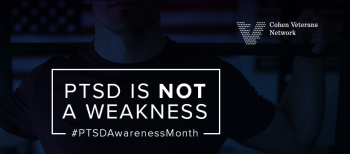Home /
June is Post Traumatic Stress Awareness Month

As an Army Veteran, a wife of an active-duty Army officer and the mother of an active duty soldier this month is particularly important to me for many reasons. I have watched and experienced first-hand the effects post-traumatic stress (PTS) can have on those closest to me. Those affected by post-traumatic stress disorder (PTSD) are usually unaware that they are struggling. Yet, it is their loved ones who notice the changes first. Watching a loved one suffer is difficult, not knowing how to attend to their pain leaves you feeling helpless. A wound that is not visible, and rarely spoken of, must now be tended to, but how? As Veteran’s and military families we know all too well the principle of “never to be left behind”, the journey toward healing is no different. It is important to know that you are not alone and you do not have to walk this path in silence.
Post-traumatic stress is often misunderstood. And sadly, post-traumatic growth (that can regularly occur as a result of overcoming our life experiences) is rarely acknowledged. Below, I outline some myths often associated with post-traumatic stress that help to demystify this commonly used vernacular while also- hopefully- shedding light on some of the common myths associated with this language.
Myth #1: Only Veterans get post-traumatic stress disorder (PTSD)
No one is immune to trauma. Millions of American’s, many who have never served in the military, cope each year with post-traumatic stress. Some groups of people are at an increased risk for a post-traumatic stress diagnosis, or PTSD. People who suffer from anxiety or depression, those who work in highly stressful environments and those who have experienced childhood traumas or multiple traumas in their lifetime are more susceptible. Post-traumatic stress can impact people from all walks of life. Trauma does not discriminate.
Myth #2: Being diagnosed with PTSD leads to a poor quality of life
A diagnosis of post-traumatic stress disorder can affect a person’s ability lead a healthy lifestyle, but only truly if left untreated. PTSD can cause debilitating effects upon the person and their loved ones but understanding the trauma, developing positive coping skills and awareness are key. With the help of professionals and a supportive network, a person can live a productive life. Similar to a physical wound, when cared for and paid attention to, healing will happen.
Myth # 3: Only Veterans who experience combat can be diagnosed with PTSD
Most people will experience a traumatic experience at some point in their lives. It’s not entirely clear what predicts whether someone will develop PTSD, but there are factors that might increase someone’s vulnerability. Some of these factors include repeated trauma, increased negative life events (i.e. sexual abuse, divorce or childhood neglect).
Military members can experience trauma outside of combat operations. Military Sexual Traumas, non-combat traumas such as a vehicle roll over’s or a training accident can also result in PTSD.
Myth #4: PTSD can’t go away
Once a traumatic experience occurs, it becomes a part of you and a part of your story. As much as we would like to dial back time, we cannot. People with PTSD may avoid treatment, as getting better often requires working through the very trauma we don’t want to talk about. But while it can be difficult, it also allows a person to return to living their life without the interference of that trauma in our day-to-day life. Despite the scar always being present, with the right type of help, someone suffering can, in fact get back to better than they were before.
Myth #5: Seeking signals weakness
The responses and behaviors that are part of our short and long-term response to trauma(s) are not voluntary; they are the brain’s way of protecting a person from a threat or danger- and are normal. These responses can be very scary but ABSOLUTELY don’t indicate weakness.
Taking care of our mental health has been stigmatized for far too long in this country. Similar to medical “cures” we know what works to heal trauma. If you, or someone you care about, is dealing with an unnamed trauma in their lives… we are here to help!


